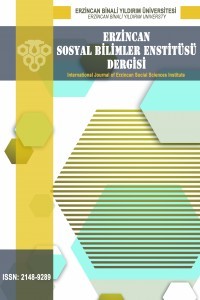KATOLİK - YAHUDİ DİYALOĞU: TARİHÇE VE ANA KONULAR
Pek çok Yahudi, II. Dünya Savaşı sonrasında gelişen Hıristiyanların Yahudiler ve Yahudilik hakkında devrim sayılacak nitelikteki teolojik değişimleri konusunda ka-yıtsızdır. Buna karşın Katolikler, Yahudilerle ilgili olarak Yeni Ahit‟e dayanan bir kurtuluş öğreti geliştirerek organizeli bir Yahudi misyon teolojisi geliştirmemişler-dir. Bunun yerine Katolikler, Yahudilerle ilgili olarak ahit, Mesih, seçilmiş halk gibi ortak teolojik konular ışığında hem misyon teolojisi açısından hem de antropolojik endişeler açısından Yahudilerle diyaloğa özel önem vermektedirler.
Anahtar Kelimeler:
Yahudilik, Katolik Kilisesi, Dinlerarası Diyalog, Katolik- Yahudi Diyaloğu
CATHOLIC- JEWISH DIALOGUES: HISTORY AND MAIN SUBJECTS
Most Jews remain ignorant and unaware of the revolutionary changes which have taken place between Christian groups and Jews and Judaism since the end of World War II. On the other hand for Catholics, the New Testament is built entirely on the Old Testament. For this reason the Catholic Church has no organized mission to the Jews, as is the case for instance in certain Evangelical circles. Instead, the Roman Catholic curia want to dialoge with Jews in hope of their faith in Jesus Christ, as well as in the covenant done for Jews, and the concept of the Chosen People. There-fore fort hem Catholic- Jewis dialogue has the importance in the sense of mission theology and anthropological concerns.
___
- Akashe, Khaled, “Repert on the Activities of the PCID: Relations with Muslims”, Pro Dialogo, 1992/2, 218.
- “At the Yad Vashem Mausoleum”, Pro Dialogo, 2000/2-3, 173- 174.
- “Concluding Ceremony”, Pro Dialogo, 2002/1, 154.
- Croner, Helga, Stepping Stones to Further Jewish-Christian Relations, and More Stepping Stones to Jewish-Christian Relations: An Unabridged Collection of Christian Documents, 1975-1983, New York 1985
- “Dabru Emet. A Jewish Statement on Christians and Christianity,” www.bc.edu/research/cjl/metalements/texts/cjrelations/resource s/documents/jewish/dabru_emet.htm (14/02/2012).
- “Directory fort he Application of the Principles and Norms on Ecumenism”, Interreligious Dialogue- Official Teaching of The Catholic Church (1963- 1995), ed. Francesco Gioa, Boston 1997, 643.
- “Discourses and Teaching of the Holy Father”, Pro Dialogo, 2005/3, 257.
- Fisher, E. - L. Klenicki, In Our Time: The Flowering of Jewish-Catholic Dialogue, Stimulus 1990.
- Flannery, Edward H., The Anguish of the Jews, Paulist Press, New York 199 --------, Visions of the Other: Jewish And Christian Theologians Assess the Dialogue, Stimulus 1994.
- “General Audience: The Common bonds which exists between Jews and Christians”, Pro Dialogo, 1999/3, 298- 300.
- “Guidelines for Catholic-Jewish Relations” Origins 4/3 (16 January 1974); Hayes, Michael A. “From Nostra Aetate to We Remember: A Reflection on The Shiah”, Christian- Jewish Relations Through Centuries, ed. Stanley E. Porter – Brook W. R. Pearson, Sheffield 2000, 4264
- Henrix, Hans Hermann, “After 40 Years, Nostra Aetate‟s Christological Implications” Studies in Jewish - Christian Relations, 1 (20042005), 24- 25.
- International Catholic-Jewish Liaison Committee, Fifteen Years of CatholicJewish Dialogue 1970-1985, Rome 1988.
- Interreligious Dialogue- Official Teaching of the Catholic Church (19631995), ed. Francesco Gioa, Boston 1997.
- Jospe, Raphael, “Pluralism out of the Sources of Judaism: Religious Pluralism without Relativism”, Studies in Jewish - Christian Relations, 2/2 (2007), 93. --------,“The Concept of the Chosen People: An Interpretation” in Judaism: A Quarterly Journal 170, vol. 43, no. 2 (Spring, 1994): 1271
- Kellner, Menachem, Must a Jew Believe Anything?, London 2006.
- Miller, Michael J., “Catholic Education and Interreligious Dialogue Forty Years After Nostra Aetate”, Pro Dialogo, 2005/1, 74- 75.
- “Notes”: Origins 15: 7 (4 July 1985); 102-103.
- “Nostra Aetate, 4/13”, Interreligious Dialogue- Official Teaching of the Catholic Church (1963- 1995), ed. Francesco Gioa, Boston 1997,40
- “Redemptionis Anno”, Interreligious Dialogue- Official Teaching of the Catholic Church (1963- 1995), 92.
- Rosen, David, The Impact of the Jewish-Christian Dialogue upon Theological Thought, Roma 1997.
- Oberman, Heiko, The Roots of Anti-Semitism in the Age of Renaissance and Reformation, Philadelphia 1984.
- The Diaries of Theodore Herzl, New York 1962, 421.
- “Testimonies for Peace”, Pro Dialogo, 2002/1, 146- 148.
- “To Representatives of the Jewish Community of Rome (Apr.13, 1986), L‟Observatore Romano, 6.
- To Representatives of the Jewish Community of Rome”, Interreligious Dialogue- Official Teaching of The Catholic Church (19631995), 332-335.
- “To the Christian, Jewish and Muslim Leaders”, Pro Dialogo, 2000/2-3, “To a Delegation of the International Jewish Committee on Interreligious Consultation”, Pro Dialogo, 2005/2, 165.
- To Represantatives of the Jewish Community of Rome”, Interreligious Dialogue- Official Teaching of The Catholic Church (19631995), 332, 334.
- “Solenm Magistrerium of Paul VI”, Interreligious Dialogue- Official Teaching of The Catholic Church (1963- 1995), 74.
- Stransky, Thomas F., “The Catholic- Jewish Dialouge: Twenty Years, After „Nostra Aetate‟”, America, 6 (February 1986), 92. www.thecatholictelegraph.com/pope-says-catholic-jewish-dialogueimportant-for-society/4002 (12/02/2012). www.vatican.va/holy_father/john_paul_ii/speeches/1997/october/documents /hf_jpii_spe_19971031_com-teologica_en.html (14/02/2012).
- Yayın Aralığı: Yılda 2 Sayı
- Başlangıç: 2008
- Yayıncı: Erzincan Binali Yıldırım Üniversitesi
Sayıdaki Diğer Makaleler
KÜLTÜRÜMÜZDE ÇERÇİ ESNAFLIĞININ SON ÖRNEKLERİNDEN “TESPİH ÇERÇİLİĞİ”
BAYESCİ AĞLARDA RİSK ANALİZİ: BANKACILIK SEKTÖRÜ ÜZERİNE BİR UYGULAMA
Emre DÜNDER, Mehmet CENGİZ, Haydar KOÇ, Nurettin SAVAŞ
ÇEVRE MALİYET RAPORU: AŞKALE ÇİMENTO
HURRİ’LERİN SİYASİ ORGANİZASYONLARI
TEMEL DİNİ DEĞERLER VE DEĞERLER EĞİTİMİ
ERZİNCAN KAZASININ YERLEŞME ÖZELLİKLERİ (XVI-XX YÜZYILLAR ARASI)
OSMANLI DEVLETİNDE POLİSİN MESLEKÎ TERBİYESİNE MÜTEALLİK BİR TALİMAT-I MAHSUSA
KATOLİK - YAHUDİ DİYALOĞU: TARİHÇE VE ANA KONULAR
SUAT ENGÜLLÜ’NÜN “GELİN ZAMBAKLARI” ADLI ÖYKÜSÜNE GÖSTERGEBİLİMSEL BİR YAKLAŞIM
